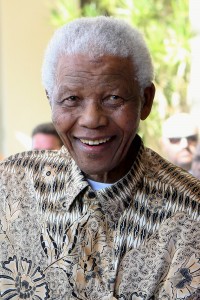By Petamber Persaud

Nelson Mandela has seeped into the psyche of peoples worldwide, including the people of Guyana, through various sources – mainly books, music, films and quotations (the words of Mandela).
It is difficult to measure that effect. That effect is more, much more than naming a street in tribute to the man. Other manifestations of that effect can be seen daily especially in letters to local newspapers.
Mandela came to Guyana through the following sources:
Films
Many outstanding actors played Nelson Mandela in memorable portrayal of the man. In the 1987 HBO film Mandela was played by Danny Glover. Ten years later, Sidney Poitier played Mandela in “Mandela and de Klerk”. In 2007, Dennis Haysbert played Mandela in “Goodbye Bafana”. Two years later, Morgan Freeman portrayed Mandela in “Invictus”. Then in 2013, the big hit, “Mandela: Long Walk to Freedom” in which Mandela was played by Idris Elba.
Music
Music is another art form through which Mandela pervaded the Guyanese consciousness. Here’s a short list of songs that spoke about, and still speak to the man and his work.
‘Number 46664” by Bono, Joe Strummer and Dave Stewart
“Free Nelson Mandela” by the Specials
“Mandela, bring him back home” by Hugh Masekela
“Asimbonanga” by Johnny Glegg (a music video in which Mandela was a part)
“Nelson Mandela song” by Nomfusi & The Lucky Charms
“Freedom now” by Tracy Chapman
“Mandela” by Carlos Santana
“Prophet of Rage” by Public Enemy
“Ordinary love” by U2
The more one listens to the songs the more the songs seem to speak to the life and work of the man.
Books
Monday evening I listened to excerpts from the “Long Walk to Freedom: The Autobiography of Nelson Mandela” which tells of his early years, a childhood of activities lived in a place where he could enjoy the neat line of the horizon.
David James Smith’s “Young Mandela” tells about the rise of Mandela in the African National Congress. From reviews, this was a riveting piece of writing, showing rather than telling the story of the man. Looking back on those formative days, we could see the making of greatness through humility.
“Mandela’s Way”, by Richard Stengel, transforms Mandela’s prison experiences into the life lessons, which we may be advised to take from the book. (Some of the quotations in the following section will bear witness to this.)
In his own Words
The following quotations “copyright © 2010 by Nelson R. Mandela and The Nelson Mandela Foundation or From Nelson Mandela by Himself: The Authorised Book of Quotations’.
Difficulties break some men but make others. No axe is sharp enough to cut the soul of a sinner who keeps on trying, one armed with the hope that he will rise even in the end.
It is in the character of growth that we should learn from both pleasant and unpleasant experiences.
Everyone can rise above their circumstances and achieve success if they are dedicated to and passionate about what they do.
A critical, independent and investigative press is the lifeblood of any democracy.
I like friends who have independent minds because they tend to make you see problems from all angles.
Long speeches, the shaking of fists, the banging of tables and strongly worded resolutions out of touch with the objective conditions do not bring about mass action and can do a great deal of harm to the organisation and the struggle we serve.
It is never my custom to use words lightly. If twenty-seven years in prison have done anything to us, it was to use the silence of solitude to make us understand how precious words are and how real speech is in its impact on the way people live and die.
You sharpen your ideas by reducing yourself to the level of the people you are with and a sense of humour and a complete relaxation, even when you’re discussing serious things, does help to mobilise friends around you. And I love that.
What counts in life is not the mere fact that we have lived. It is what difference we have made to the lives of others that will determine the significance of the life we lead.
Death is something inevitable. When a man has done what he considers to be his duty to his people and his country, he can rest in peace. I believe I have made that effort and that is, therefore, why I will sleep for the eternity.
Many Guyanese have had the good fortune to meet the man in person, meetings that would tell their own stories and add to the avalanche of material soon to surface, all contributing in time to the shaping of Guyanese literature.
Responses to this author telephone (592) 226-0065 or email: oraltradition2002@yahoo.com
What’s happening:
• “An Introduction to Guyanese Literature” is now available from the listed contacts; Austin’s Book Service and at the National Library. This book is an up-to-date guide featuring significant literary landmarks from the 16th century to the new millennium. This 150-page book including over 100 photographs is an attempt at bringing to the fore little known facts about lesser known aspects of our literature. The big books, the big authors and the big success stories in Guyanese Literature are also featured.



